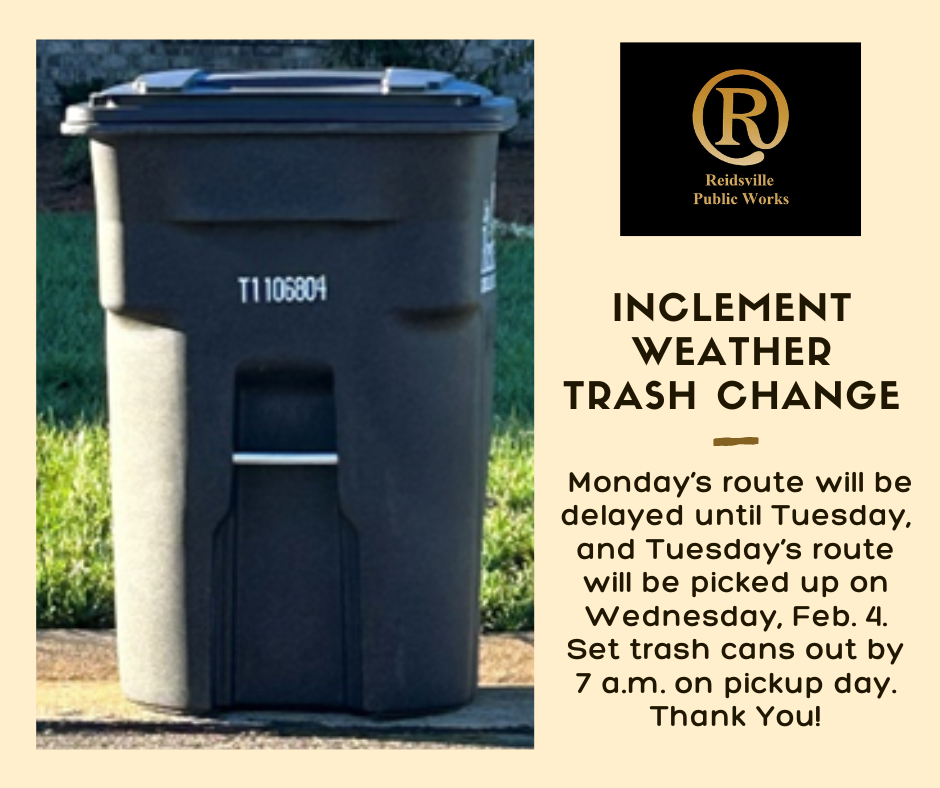City experiences water outage related to storm
- astadler94
- May 13, 2025
- 3 min read
Reidsville City Public Works crews are working to fix a water main break that occurred in the early morning hours of Tuesday, May 13, and has left much of the City without water.
At approximately 3:30 a.m. today, City of Reidsville Public Works staff were notified of residents and businesses not having water. Public Works staff immediately responded to investigate the complaints.
Electrical surges brought on by Monday night’s weather caused one of the Reidsville Water Plant’s high service pumps to rapidly energize and de-energize, cutting on and off. This caused excessive pressure in the water distribution system, which led to a water main break on one of the City’s 12-inch pipes. Roughly a 4-foot section of pipe was broken, causing a rapid loss of water supply and pressure.
City crews immediately began searching for the water main break. After locating the break, Public Works has been on site for several hours working to fix the leak. Citizens should see a gradual restoration of water pressure throughout the day.
After the leak is completely repaired, the City will pull samples for testing and alert citizens when the boil advisory is lifted. In the meantime, Reidsville residents on the City’s water system will be under a Boil Water Advisory, which is normal procedure in such cases. The advisory is in effect until further notice. Customers are advised to boil all water used for human consumption - this includes drinking, making ice, brushing teeth, washing dishes, food preparation, etc. Residents and businesses are urged to conserve water or to use bottled water until these problems are resolved.
Boiling Water Advisory Tips from the CDC:
If local officials issue a boil water advisory, use commercially bottled water or boil your tap water. If commercially bottled water is not available, boil your tap water. To kill germs, bring water to a full rolling boil for 1 minute. At elevations above 6,500 feet, boil for 3 minutes. To avoid burns, allow boiled water to cool before you use it. Boil your tap water even if you filter it. For example, still boil tap water if it has been through a home water filter or a pitcher that filters water.
For drinking and cooking: use commercially bottled water or boiled water for drinking and to prepare and cook food.
Handwashing: in many cases, you can use tap water and soap to wash your hands during a boil water advisory.
Bathing and showering: be careful not to swallow any water when bathing or showering. Use caution when bathing babies and young children. Consider giving them a sponge bath to reduce the chance of them swallowing water. Brushing teeth: brush your teeth using boiled water or commercially bottled water. Do not use tap water that you have not boiled first.
Washing dishes: if possible, use disposable plates, cups, and utensils during a boil water advisory. Sanitize all baby bottles.
Dishwashers are generally safe to use if they have a sanitizing cycle or reach a final rinse temperature of at least 150°F (66°C). Check the manual or contact the manufacturer to find out what temperature your dishwater reaches.
To wash dishes by hand:
Wash and rinse the dishes as you normally would using hot water.
In a separate basin, add 1 teaspoon of unscented household liquid bleach for each gallon of warm water.
Soak the rinsed dishes in the water for at least one minute.
Let the dishes air dry completely before using them again.
Laundry: It is safe to wash clothes as usual.
Caring for pets: Give pets commercially bottled water or boiled water that has cooled. Pets can get sick from some of the same germs as people or spread germs to people.
Caring for your garden and houseplants. You can use tap water for houseplants and gardens, including watering plants you eat.




